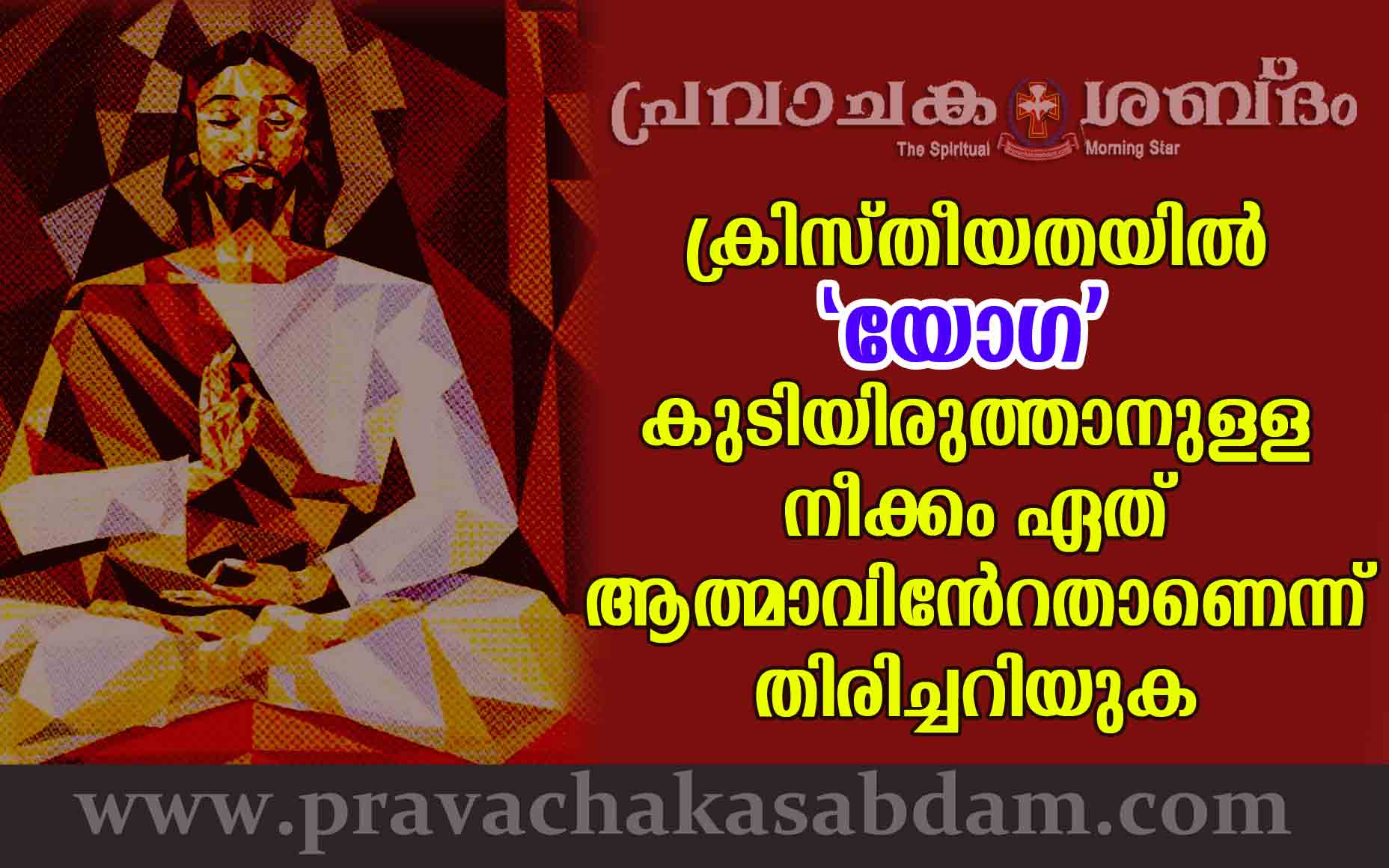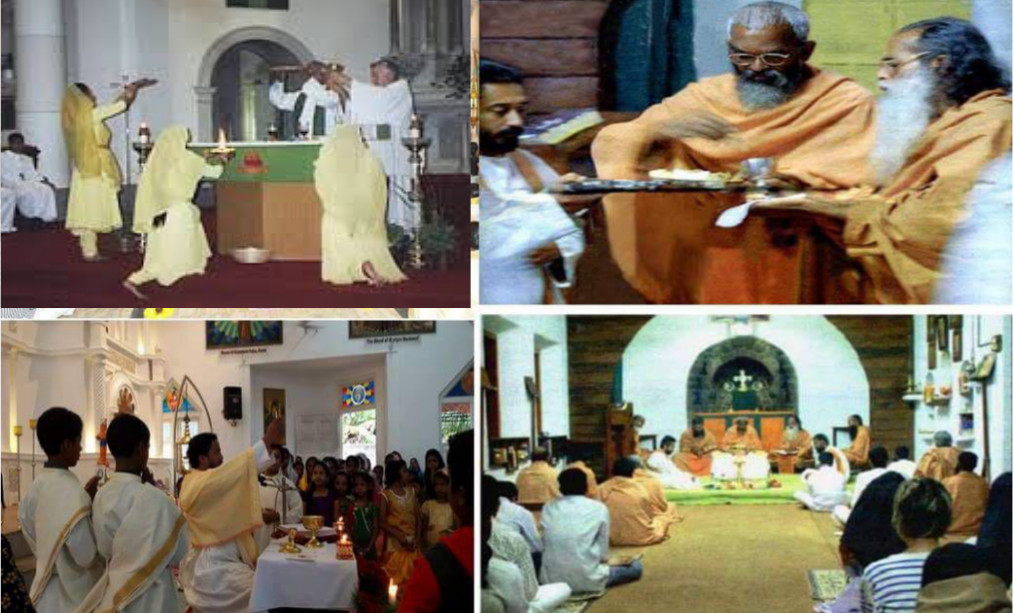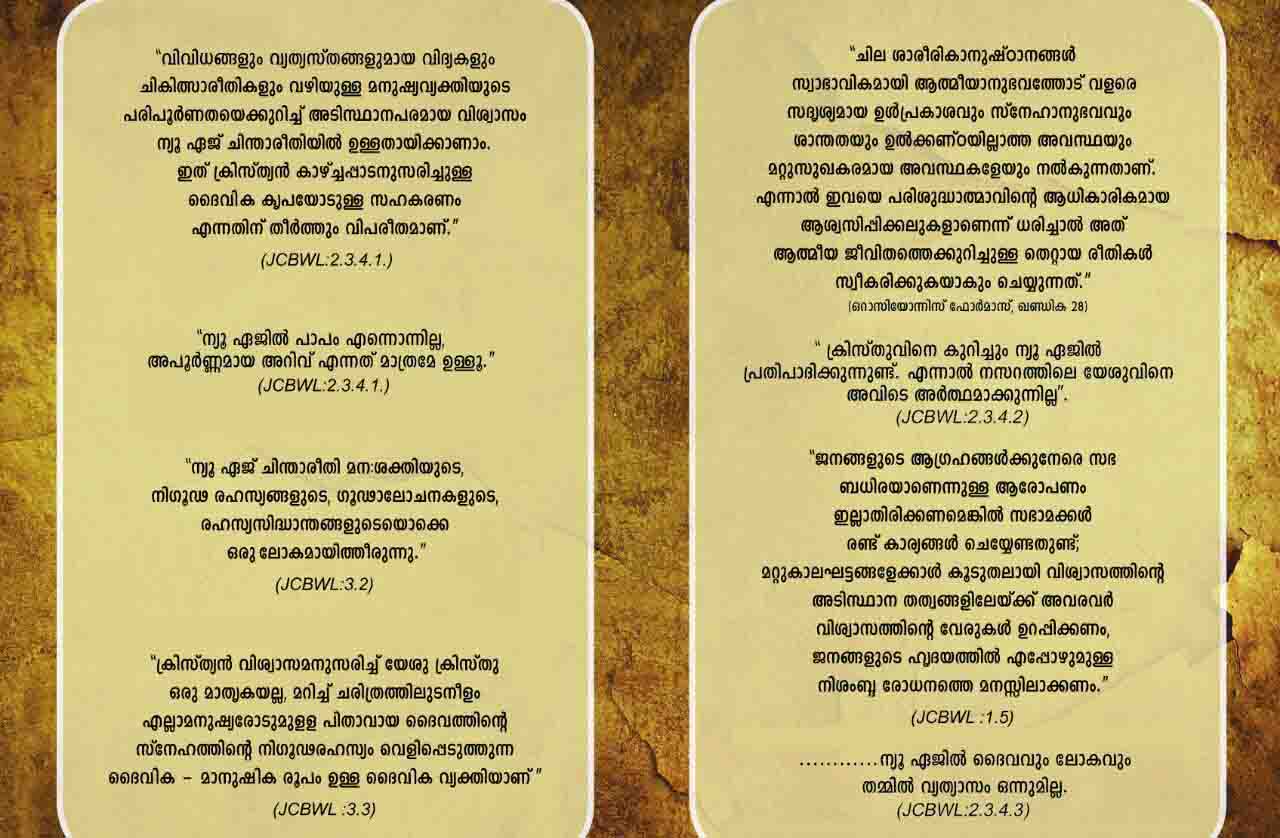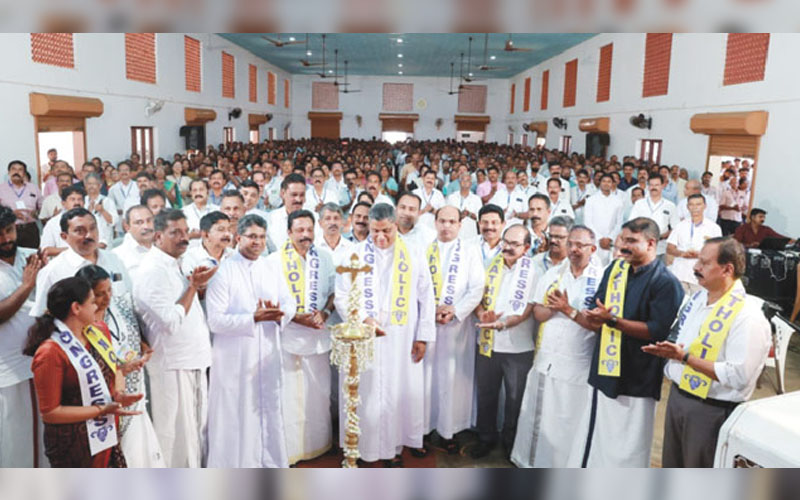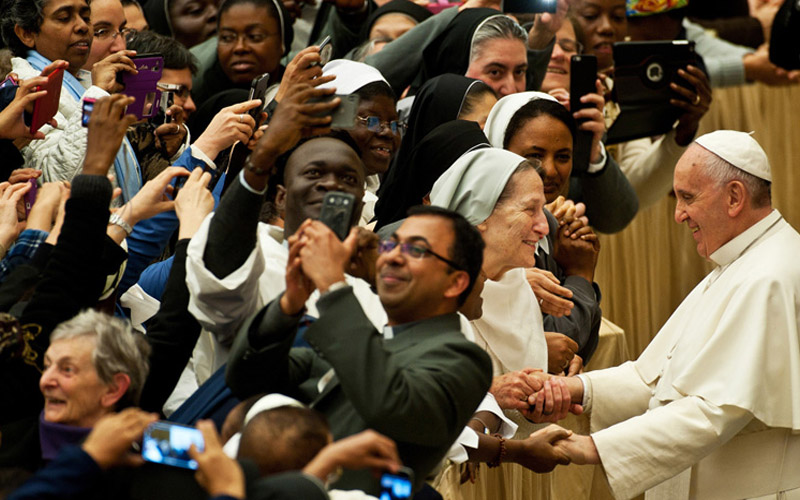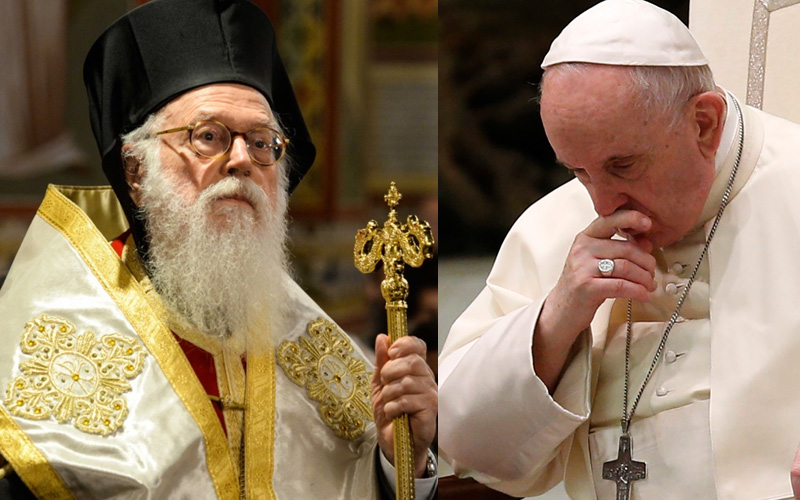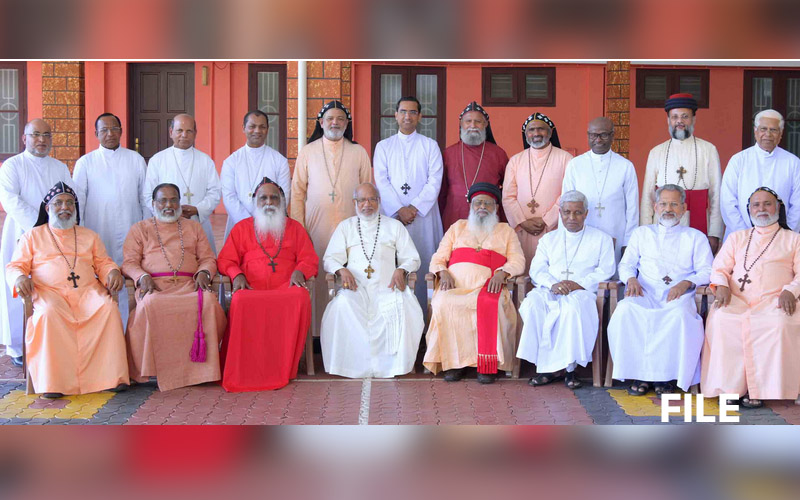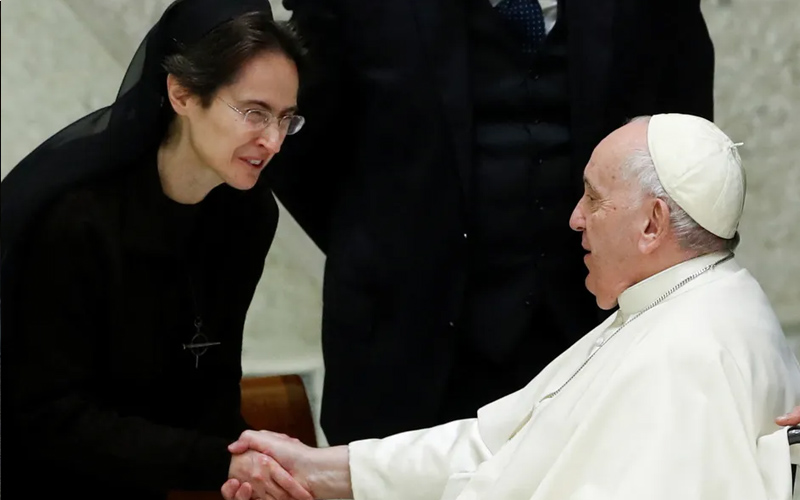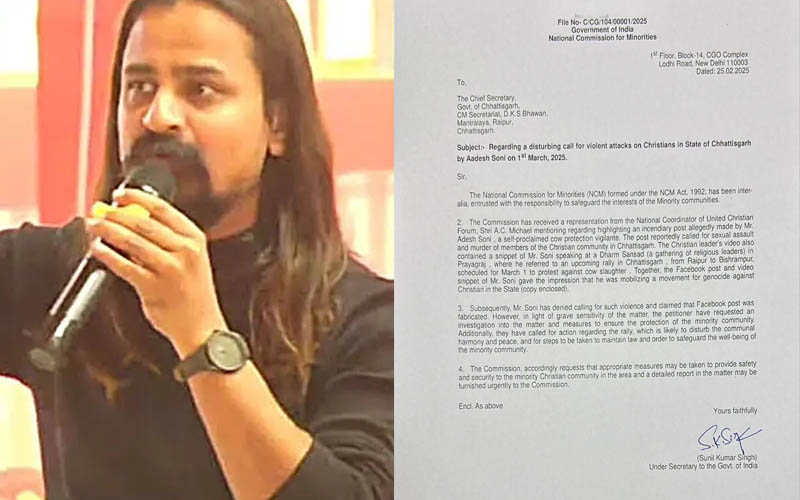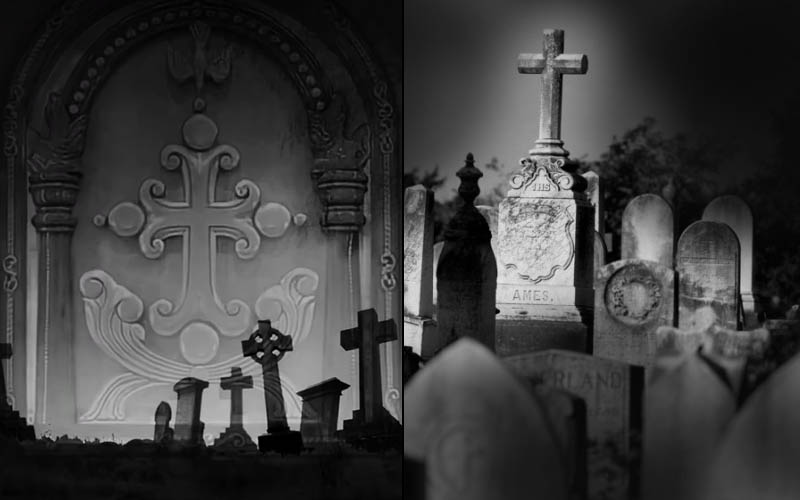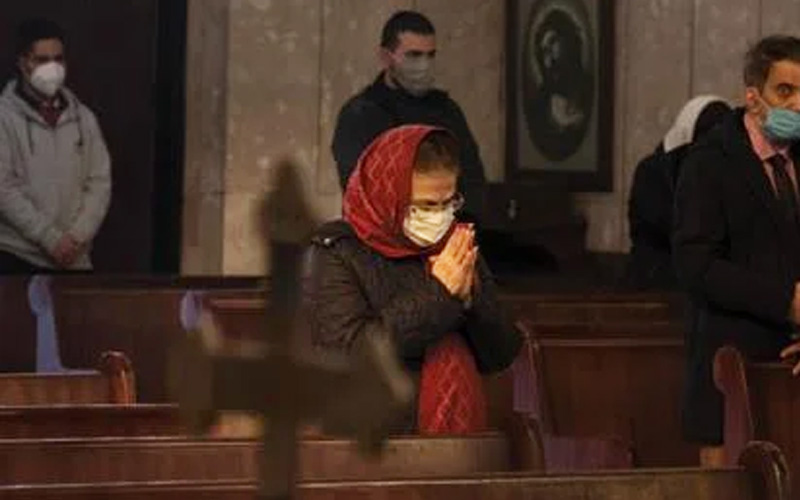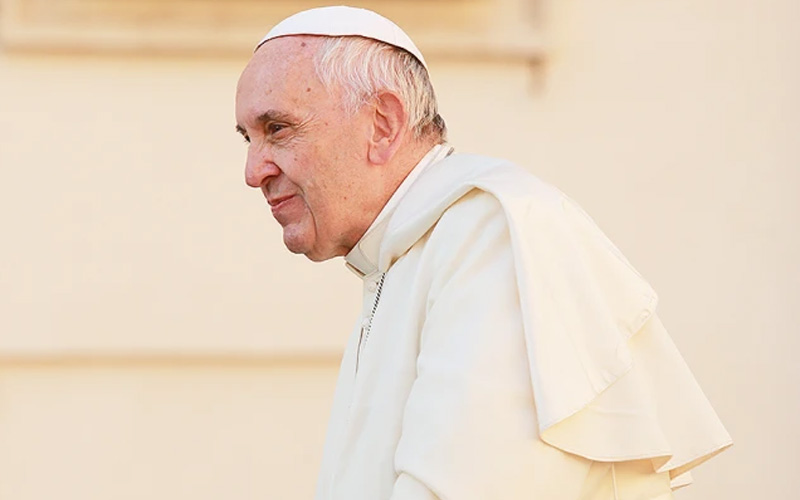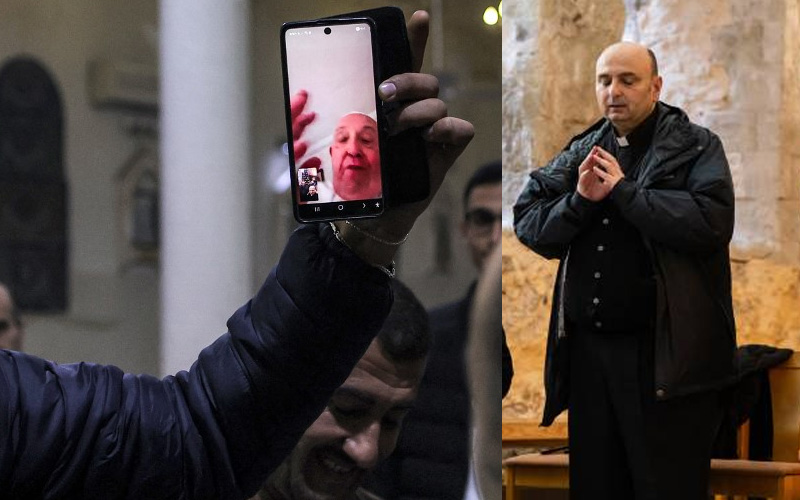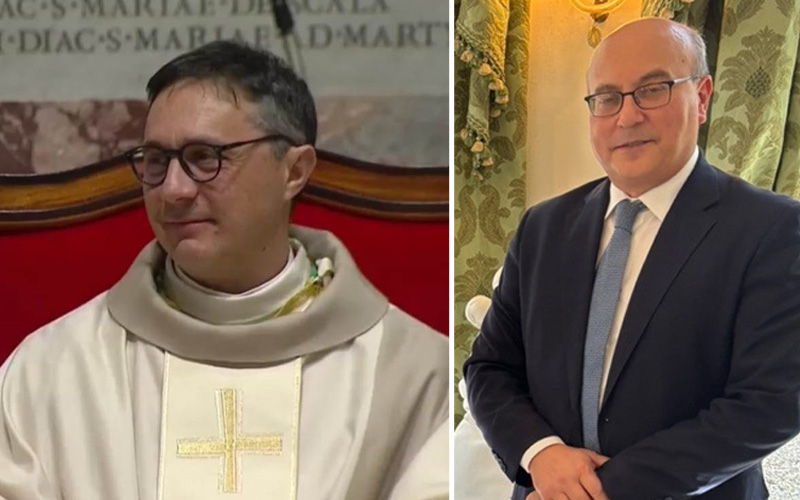Saturday Mirror
ക്രിസ്തീയതയില് 'യോഗ' കുടിയിരുത്താനുള്ള നീക്കം ഏത് ആത്മാവിന്റേതാണെന്ന് തിരിച്ചറിയുക: ഭാഗം 3
ഫാ. അഗസ്റ്റിന് പാറപ്ലാക്കല് 02-12-2017 - Saturday
യോഗ എന്ന വിപത്ത്: കേരളസഭ ജാഗ്രത പുലർത്തണം; ഭാഗം 1: വായിക്കുവാന് ഇവിടെ ക്ലിക്ക് ചെയ്യുക
യോഗയുടെ തത്വശാസ്ത്രം സഭയെ പടുത്തുയര്ത്തുകയല്ല, പടുക്കുഴിയിലാക്കുന്നു: ഭാഗം 2: വായിക്കുവാന് ഇവിടെ ക്ലിക്ക് ചെയ്യുക
രണ്ടാം ഭാഗത്തിന്റെ തുടര്ച്ച.......................
V. ''മാര്ഗനിര്ദേശങ്ങള്''
കമ്മീഷന്റെ മാര്ഗനിര്ദേശങ്ങളാണ് അഞ്ചാംഭാഗത്തുള്ളത്: വിസ്താരഭയത്താല് ഓരോ നിര്ദേശവുമെടുത്ത് വിശകലനം നടത്തുന്നില്ല. തന്നെയുമല്ല ആദ്യനാലുഭാഗങ്ങളുടെ വിശകലനം കമ്മീഷന്റെ മാര്ഗനിര്ദേശങ്ങളെഎത്രമാത്രം വിലമതിക്കണമെന്നതിലേയ്ക്ക് വെളിച്ചം വീശുന്നതുമാണ്. ആകയാല് അത്യാവശ്യകാര്യങ്ങള് മാത്രമേ ശ്രദ്ധയില്പ്പെടുത്തുന്നുള്ളു. ഒമ്പതു മാര്ഗനിര്ദേശങ്ങളാണ് റിപ്പോര്ട്ട് അക്കമിട്ടുനിരത്തുന്നത്. അതില് 1,6,7,8,9 എന്നിവ യോഗ അഭ്യസിക്കുമ്പോള് ക്രൈസ്തവര് ചിലമുന്കരുതലുകള് പാലിക്കണമെന്ന് പറഞ്ഞൊപ്പിക്കുന്നു. 2,3,4,5 ഇവ ക്രൈസ്തവര് യോഗ അഭ്യസിക്കേണ്ടതുതന്നെയാണെന്നും അതിനെ പ്രോ ത്സാഹിപ്പിക്കണമെന്നുമുള്ള കമ്മീഷന്റെ മുന്നിശ്ചയത്തെ സാധൂകരിക്കാനുള്ള ന്യായങ്ങള് നിരത്തുന്നു.
ഇവ വായിച്ചപ്പോള് ഓര്മ്മയില് വന്നത്: ''ഉടുപ്പുകത്താതെ മാറിടത്തില് തീ കൊണ്ടുനടക്കാന് ആര്ക്കുകഴിയും?'' (സുഭാഷിതം 6:27) എന്ന വചനമാണ്. അത്തരത്തിലൊന്ന് സാധിക്കണമെന്നാണ് കമ്മീഷന് പറയുന്നത്. യോഗയുടെ ആഴങ്ങളിലേയ്ക്കുകടക്കുന്ന തത്വശാസ്ത്ര-ദൈവശാസ്ത്ര പരിശീലനം ലഭിച്ച ക്രൈസ്തവ പുരോഹിതര്പോലും നെല്ലും പതിരും തിരിച്ചറിയാതെ pluralistic relativistic ആശയങ്ങള്ക്ക് വശംവദരാകുന്നുവെന്നിരിക്കെ (ഇതിന് തെളിവ് വേണമെന്നുള്ളവര് റവ.ഫാ സൈജു തുരുത്തി MCBSന്റെ ''ക്രിസ്താനുഭവയോഗ'' എന്ന പുസ്തകം വായിക്കുക) സാധാരണക്കാരായ വിശ്വാസികള്ക്ക് ഇതെങ്ങനെ സാധിക്കും?
അതിന് അവരെ പ്രാപ്തരാക്കണമെങ്കില് എല്ലാറ്റിനുമുപരിയായി ആദ്യം ചെയ്യേണ്ടത് നവയുഗ ആത്മീയതയെപ്പറ്റിയും അതിനോട് ചേര്ന്നുപോകുന്ന പൗരസ്ത്യ ധ്യാനരീതികളെപ്പറ്റിയും തിരുസഭ നല്കിയിട്ടുള്ള പ്രബോധനങ്ങള് അവരെ നന്നായി പഠിപ്പിക്കുക എന്നതാണ്. അത്തരത്തിലുള്ള ഗൗരവനീക്കങ്ങള് നടത്താതെ ഇത്തരത്തിലുള്ള റിപ്പോര്ട്ടുകളെ ആധാരമാക്കി ക്രൈസ്തവരെ യോഗ അഭ്യസിപ്പിക്കാന് ശ്രമിക്കുന്നത് അപരിഹാര്യമായ ദോഷഫലങ്ങള് ഉളവാക്കുമെന്നത് തര്ക്കമറ്റകാര്യമാണ്.
''തത്വത്തില് യോഗാഭ്യാസത്തോട് നാല് സമീപനങ്ങള് സാധ്യമാണെന്ന് പറഞ്ഞുവെങ്കിലും, പ്രയോഗത്തില് സമീപനങ്ങളുടെ വ്യതിരക്തത നിലനില്ക്കുന്നുണ്ടോയെന്നത് ചിന്താര്ഹമായകാര്യമാണ്'' എന്ന അഞ്ചാം ഭാഗത്തിന്റെ ആരംഭത്തിലുള്ള കമ്മീഷന്റെതന്നെ വാക്കുകള് ഈ മാര്ഗനിര്ദേശങ്ങളുടെ അപ്രായോഗികതയേയും വെളിവാക്കുന്നു.
ചുരുക്കത്തില്, തിരുസഭ യാതൊന്നിനെതിരെ ജാഗ്രത പുലര്ത്തണമെന്ന് ആവര്ത്തിച്ച് പറഞ്ഞുവോ അതിനെ ഈ വിധം പ്രോത്സാഹിപ്പിക്കാനും ക്രിസ്തീയതയില് കുടിയിരുത്താനുമുള്ള നീക്കം ഏത് ആത്മാവില്നിന്നുവരുന്നു എന്നത് ശരിക്കും വിവേചിച്ചറിയേണ്ടതു തന്നെയാണ്. വിശ്വാസസംരക്ഷണത്തിനും സമര്ത്ഥനത്തിനും ജീവിതം ഉഴിഞ്ഞുവച്ച ബെനഡിക്ട് പാപ്പായുടെ വാക്കുകള് ഇത്തരുണത്തില് പ്രാധാന്യമര്ഹിക്കുന്നു:
“The Church’s main job is the care of the faith of the simple. The care of the faith of the ‘little ones’ must always be more important than the fear of some conflict with the powerful” (Cardinal Ratzinger, at St. Michael’s College, Toronto, April14, 1986). ഇനി Nostra Aetate (അക്രൈസ്തവ മതങ്ങള്) എന്ന രേഖയുടെ അന്തഃസത്ത എന്താണെന്നതിലേക്ക് കടക്കാം.
Nostra Aetate യുടെ യഥാര്ത്ഥ സന്ദേശം
രണ്ടാം വത്തിക്കാന് കൗണ്സിലിന്റെ ലക്ഷ്യത്തെ അട്ടിമറിക്കാന് ശ്രമിച്ചവര് ഏറ്റവുമധികം ദുരുപയോഗിച്ചത് Nostra Aetate എന്ന കൗണ്സില് declaration -നെയാണ്. Nostra Aetate എന്ന പേരു പറയുക, പിന്നെ എന്തും ഏതും അന്യമതങ്ങളില് നിന്നും സംസ്ക്കാരത്തില് നിന്നും സ്വീകാര്യമാണെന്ന് വാദിക്കാം എന്ന സ്ഥിതിയിലേക്കുവരെ കാര്യങ്ങളെത്തി. കമ്മീഷന് റിപ്പോര്ട്ടും പല തവണ ഈ രേഖയെ പരാമര്ശിക്കുന്നുണ്ട്. തന്മൂലം Nostra Aetate യുടെ യഥാര്ത്ഥ അന്തസത്തയെപ്പറ്റിയും അതിനെ ദുരുപയോഗിച്ചിട്ടുണ്ടോ എന്നതിനെപ്പറ്റിയും ഒരു സാമാന്യപരിശോധന ആവശ്യമായിരിക്കുന്നു.
ഇതിന് മുഖ്യമായൂം ആധാരമാക്കുന്നത് ഇക്കാര്യത്തെപ്പറ്റി ഏറ്റം ആധികാരികമായി സംസാരിക്കാന് കഴിയുന്നവരില് ഒന്നാമനായ പരിശുദ്ധ പിതാവ് ബെനഡിക്റ്റ് പതിനാറാമന്റെ വാക്കുകളെയാണ്. ഈ പരിശോധനയ്ക്ക് ആമുഖമായി ഉക്രൈനിലെ Pidhirtsi യിലുളള OSB Monastery യിലെ സന്യാസൈവദികര് The Fruit of Nostra Aetate - Letter to Cardinals and Bishops of the Catholic Church എന്ന പേരില് 2006 സെപ്റ്റംബര് 21-ന് നല്കിയഒരു കത്തിലെ ചില കാര്യങ്ങള് ഉദ്ധരിക്കട്ടെ.
ഈ കത്ത് ആരംഭിക്കുന്നത് ഇങ്ങനെയാണ്: “Most Reverend Church Fathers, Please ask the Holy Father Benedict XVI, in such urgent time to issue a binding proclamation concerning a correct interpretation of the conciliar Nostra Aetate declaration. You together with him have been given the responsibility for the boat of the Church which is tossing in a grave storm. Without a clear word the process of internal decay and apostasy from the Church will continue and we will be facing a collapse” ഈ ആഹ്വാനത്തിനുശേഷം കത്ത് ആമുഖമായി പറയുന്നത് ഇതാണ്:
“There are two big wounds through which now a days the post-conciliar Church is bleeding most and losing her identity. The first one is historic-critical theology(HCT), the second one is uncritical openness to paganism. The fruit of it is that mission has been changed for a so-called interreligious dialogue. The Word of God says nothing about dialogue but it speaks about a duty to preach the Gospel: “so that gentiles will turn from darkness to light and from the power satan to God” (Acts 26:18) ഇതിനുശേഷം സുവിശേഷവേലയ്ക്കിടയില് പാസ്റ്റര്മാരായ Isac Raju, K. Daniel, Yesu Das ഇവര് ഇന്ത്യയില് കൊല്ലപ്പെട്ട വാര്ത്ത "The Voice of Martyrs’ എന്ന ജേര്ണല് റിപ്പോര്ട്ട് ചെയ്തത് ഉദ്ധരിച്ചിട്ട് കത്ത് തുടരുന്നു.
"Evangelical pastors in India are being killed, however, on the other hand a Catholic priest in Velankanni (India as well), Father Arul Irudayen boasted that Hindus now perform their pagan rites inside the shrine of his church. This is the fruit of the false spirit of the Council and of the false respect for other religions”. 'ക്രിസ്താനുഭവയോഗ' എന്ന പുസ്തകത്തില് (P. 59) റവ.ഫാ. സൈജു തുരുത്തിയില് പറയുന്നത് ഇതോടു ചേര്ത്തു വായിക്കേണ്ടതാണ്.
'അമ്പലത്തില് പോകുന്നതും പൊട്ടുകുത്തുന്നതും സെറ്റ് സാരിയുടുക്കുന്നതും നിലവിളക്ക് കത്തിക്കുന്നതും പാപമാണെന്നല്ല നമ്മള് സ്ഥാപിക്കേണ്ടത്. ഒരു സാംസ്കാരികാനുരൂപണം എന്ന വിധത്തില് നാമിതിനെ അംഗീകരിക്കണം, സ്വീകരിക്കണം. വിശ്വാസം ഉപേക്ഷിക്കാനല്ല നമ്മുടെ വിശ്വാസത്തില് നിലനിന്നുകൊണ്ട് മറ്റ് മതത്തെയും അതിലെ നന്മകളെയും അംഗീകരിക്കുക അതാണ് ശ്രേഷ്ഠം'.
അമ്പലം അക്രൈസ്തവര് (ഹിന്ദുക്കള്) വിഗ്രഹാരാധന നടത്തുന്ന സ്ഥലമാണ്. അവിടെ പോകരുതെന്ന് ക്രിസ്തീയ വിശ്വാസികളോട് പറയുമ്പോള് അര്ത്ഥമാക്കുന്നത് അവിടെപോയി ആരാധനയോ വണക്കമോ അര്പ്പിച്ച് ഒന്നാം പ്രമാണം ലംഘിക്കരുതെന്നാണ് എന്നത് വ്യക്തമാണ്. അല്ലാതെ, വയറിംഗ്, പ്ലംബിംഗ് ആദിയായ ജോലികള് ചെയ്യുന്നവര് അവിടെ പോകരുത് എന്നല്ല. എന്നിരിക്കെ ക്രൈസ്തവര് അമ്പലത്തില് പോകരുതെന്ന് പറയുന്നത് ശരിയല്ലെന്നും ഒരു സാംസ്ക്കാരികാനുരൂപണം എന്ന വിധത്തില് അതിനെ സ്വീകരിക്കണമെന്നും അപ്രധാനമായ പലതിനുമൊപ്പം ചേര്ത്ത് ഉപദേശിക്കുന്ന തരത്തിലുളള ഒരു ചുവടുമാറ്റവും രണ്ടാം വത്തിക്കാന് കൗണ്സില് ഉദ്ദേശിക്കുന്നില്ല.
'ഭൂമിയുടെ ഉപ്പ്' എന്ന പുസ്തകത്തില് ബെനഡിക്റ്റ് പാപ്പാ സാംസ്കാരികാനുരൂപണത്തെ പറ്റി പറയുമ്പോള് നടത്തുന്ന നിരീക്ഷണങ്ങള് ഈ വിഷയം മനസ്സിലാക്കാന് ഉപകരിക്കും. ''ആഫ്രിക്കയിലും ഏഷ്യയിലും, സവിശേഷമായി ഇന്ത്യയിലും സാംസ്കാരികാനുരൂപണം എന്ന ചിന്ത പ്രബലമാണ്'' (p.198). തുടര്ന്ന് പേജ് 200-ല് പറയുന്നു: ''പേരിടാന് കഴിയാത്തതിലാണ് ദൈവം എന്ന നൈസര്ഗിക ചിന്ത ഇന്ത്യയില് ആദ്യം മുതലേ സൂക്ഷിക്കുന്ന പ്രാദേശിക പാരമ്പര്യവുമായി കൈകോര്ത്തിട്ടുണ്ട്.
സ്വാഭാവികമായും മതപരമായിട്ടുളള തെല്ലാം ഒരിക്കലും സ്വയം പ്രത്യക്ഷപ്പെടാത്ത ഏതോ ഒന്നിന്റെ പ്രതിബിംബമോ പകര്പ്പമോ രശ്മിയോ മാത്രമാണ്. അതിനാല് സത്യമായ മതം എന്നൊന്നു സാധ്യമല്ല. ഈ ജീവിതപ്പരിസരത്ത് ക്രിസ്തു മഹാനും അത്യുന്നത വ്യക്തിയും ആണെങ്കിലും അവനില് പ്രത്യക്ഷപ്പെട്ടത് മറ്റുളളവരിലും പ്രത്യക്ഷപ്പെട്ടിട്ടുളളതിനാല് അവന് വിചാരിച്ചത്ര കേമനല്ല. മറ്റു വാക്കുകളില് പറഞ്ഞാല്, ജനാധിപത്യപരമായി സഹിഷ്ണുതയുളള ലോക-മനോഭാവം മഹത്തായ സാംസ്കാരിക പാരമ്പര്യവുമായി സംയോജിപ്പിച്ചിരിക്കുന്നു......... സത്യത്തെക്കുറിച്ച് എത്രമാത്രം സംസാരിക്കാം, മതങ്ങളുടെ സാര്വ്വലൗകികവും സാര്വ്വജനീനവുമായ ഏര്പ്പാടിലേക്കു ക്രിസ്തുമാര്ഗ്ഗത്തെ ഏങ്ങനെഉള്പ്പെടുത്താം മറ്റു മതങ്ങളെപ്പോലെ ഒരു സാധാരണമതമാണ് അതും എന്ന നിലയില് - തുടങ്ങിയ ചോദ്യങ്ങള് തീര്ത്തും നവീനമായവഴികളിലൂടെ നാടകീയ മാനങ്ങള് സ്വീകരിച്ചിരിക്കുന്നു. ഈ ചര്ച്ചകളുടെ ഗുരുത്വാകര്ഷണ കേന്ദ്രം ഇന്ത്യയാണ്''.
1996 ല് 'ഭൂമിയുടെ ഉപ്പ്' എന്നു പുസ്തകത്തില് ഇങ്ങനെ വിലയിരുത്തിയ ബെനഡിക്ട് പാപ്പാ "Truth and Tolerance”(14) എന്ന തന്റെ പുസ്തകത്തില് religious relativism എന്നത് വിശകലനം ചെയ്യുന്ന കൂട്ടത്തില് പറഞ്ഞു: “The a-religious and pragmatic relativism of Europe and America can borrow a kind of consecration from India, which seems to give its renuciation of dogma the dignity of a heightended reverence for the mystery of God and man. Conversely, the way that European and American thinking has turned back to India’s philosophical and theological vision has the effect of further strengthening that relativizing of all religious figures which is part of India’s heritage. Thus it now actually seems imperative in India, even for Christian theology, to extract from its particularity the figure of Christ, regarded as western, and to set it beside Indian redemption myths as if it were of similar status: the historical Jesus, so people now think, is actually no more uniquely the Logos than any other savior figures from history are. The fact that here, in the context of the encounter between cultures relativism seems appropriate as the true philosophy of humanity gives it (as we have already suggested) such an appreciable impact, both in East and West that it hardly, seems possible to offer further reistence....”
മേലുദ്ധരിച്ചവയില് നിന്നും സാംസ്കാരികാനുരൂപണ നീക്കങ്ങളും തദനുസാരമായി രൂപപ്പെട്ട ദൈവശാസ്ത്രവും വത്തിക്കാന് കൗണ്സിലിന്റെ ഉദ്ദേശലക്ഷ്യങ്ങളുടെ അതിര്വരമ്പുകളെ വകവയ്ക്കാതെ തന്നിഷ്ടപ്രയാണം നടത്തിയിട്ടുണ്ടെന്നത് വ്യക്തമാകുന്നു. ഇക്കാര്യത്തില് ഇന്ത്യയിലെ സഭ മുന്നറിയിപ്പുകള് ലഭിച്ചിട്ടും വീണ്ടുവിചാരത്തിനു കൂട്ടാക്കാതെ മുന്നോട്ടുതന്നെ കുതിക്കാന് ശ്രമിക്കുന്നു എന്നത് പരമാര്ത്ഥമാണ്.
കൗണ്സിലിനെ അട്ടിമറിക്കാന് പ്രതിലോമശക്തികള് ശ്രമിച്ചതിനെപ്പറ്റി ബെനഡിക്ട് പാപ്പാ
തിരുസഭയ്ക്കും ലോകത്തിനു മുഴുവനും പുതിയ പന്തക്കുസ്താ പ്രദാനം ചെയ്യുമെന്നും ചെയ്യണമെന്നും തീവ്രമായി അഭിലഷിച്ച് വിളിച്ചുകൂട്ടപ്പെട്ട രണ്ടാം വത്തിക്കാന് കൗണ്സിലിന്റെ പ്രബോധനങ്ങളെ ചില ബാഹ്യശക്തികള് തെറ്റായി വ്യാഖ്യാനിച്ചതുമൂലം വ്യതിചലനങ്ങളും വിശ്വാസ ത്യാഗങ്ങളും ഉണ്ടാകുന്നതിനെപ്പറ്റി കൗണ്സില് അവസാനിച്ച 1965 -ല് ത്തന്നെ തനിക്ക് അവബോധം ഉണ്ടായിരുന്നെന്ന് Last Testament (15) എന്ന പുസ്തകത്തില് പാപ്പാ പറയുന്നുണ്ട്.
തന്മൂലം കൗണ്സില് യഥാര്ത്ഥത്തില് എന്താണ് ആഗ്രഹിച്ചതെന്നും എന്താണ് ആഗ്രഹിക്കാത്തതെന്നും വ്യക്തമാക്കുക ഒരു ദൗത്യമാണെന്ന് 1965 മുതല്ക്കെ തനിക്ക് തോന്നിയിരുന്നെന്നും പാപ്പാ വെളിപ്പെടുത്തുന്നു.ബെനഡിക്റ്റ് പാപ്പായുടെ രചനകളിലും പ്രസംഗങ്ങളിലുമെല്ലാം ഈ ദൗത്യം നിറവേറ്റാനുളള പരിശ്രമം കാണാം. വിശ്വാസ വര്ഷം പ്രഖ്യാപിച്ചുകൊണ്ട് പാപ്പാ പുറപ്പെടുവിച്ച Porta Fidei എന്ന അപ്പസ്തോലിക ലേഖനത്തിന്റെ നമ്പര് 6- ല് ശരിയായ വ്യാഖ്യാ ശാസ്ത്രമനുസരിച്ച് കൗണ്സില് പ്രബോധനങ്ങള് വ്യാഖ്യാനിക്കേണ്ടതുണ്ടെന്ന് പ്രബോധിപ്പിച്ചു.
ദൈവശാസ്ത്രാദ്ധ്യാപകന്, രൂപതാദ്ധ്യക്ഷന്, വിശ്വാസ തിരുസംഘത്തിന്റെ അദ്ധ്യക്ഷന്, തിരുസഭയുടെ ദ്യശ്യതലവന് എന്നീ നിലകളില് ജീവിതത്തിലുടനീളം മേല്പറഞ്ഞ ദൗത്യം നിറവേറ്റാന് തീവ്രമായി പരിശ്രമിച്ച ബെനഡിക്റ്റ് പാപ്പാ 2013 ഫെബ്രുവരി 11-ന് സഭാതലവന്റെ ചുമതല രാജിവച്ചതിന്റെശേഷം 14-ന് റോമാരൂപതയിലെ Clergy യോട് നടത്തിയ പ്രസംഗത്തില് പ്രതിപാദിച്ചത് രണ്ടാം വത്തിക്കാന് കൗണ്സിലിനെക്കുറിച്ചുളള തന്റെ അനുഭവങ്ങളും കാഴ്ചപ്പാടുകളുമാണെന്നത് സവശേഷ ശ്രദ്ധ അര്ഹിക്കുന്നു.
കൗണ്സിലിന് Peritus െഎന്ന നിലയില് പോകുമ്പോഴത്തെ പ്രതീക്ഷകളെക്കുറിച്ചും ഉല്സാഹത്തെക്കുറിച്ചും പാപ്പായുടെ വാക്കുകള്:***
“ So off we went to the council not just with joy but with enthusiasm. There was an incredible sense of expectation. We were hoping that all would be renewed that there would truly be a new Pentecost, a new era of the Church....” ഈ പ്രസംഗത്തില്, കൗണ്സിലിന്റെ മുഖ്യനേട്ടങ്ങളിലൊന്നായ ദൈവാവിഷ്കരണം എന്ന ഡിക്രിയെ ഇനിയും ആഴത്തില് പഠിക്കേണ്ടതുണ്ടെന്ന് പറഞ്ഞിട്ട് പാപ്പാ നടത്തുന്ന പ്രസ്താവന ഉക്രേനിയന് സന്യാസവൈദികര് ചൂണ്ടിക്കാണിച്ച് ആദ്യത്തെ മുറിവിനുളള മറുപടിയായി കണക്കാക്കാവുന്നതാണ്. Because today too, exegesis tends to read Scripture apart from the Church, apart from faith, only in the socalled spirit of the historical -critical method, a method which is important, but never to the extent of being able to offer solutions with ultimate certitude. Only if we believe that these are not human words, but God’s words, and only if there is that living subject to which God spoke and speaks, can we interpret sacred Scripture properly. And here - as I said in the forword of my book of Jesus (cf. Part One)-much remains to be done in order to arrive at an interpretation that is truly in the spirit of the Council”.
ഇതിനുശേഷം ബെനഡിക്റ്റ് പാപ്പാ പറയുന്നതില് രണ്ടാമത്തെ മുറിവിനെക്കുറിച്ചുളള ഉത്തരം കിട്ടും.
കൗണ്സിലില് Nostra Aetate എന്ന declaration എങ്ങനെ രൂപപ്പെട്ടുവന്നു എന്നത് വിവരിച്ചിട്ട് പാപ്പാ പറഞ്ഞു. "".........if one reads the text, one sees that it is very dense and prepared truly by people who were familiar with the realitites, and it indicates briefly, in a few words, what is essential, likewise it indicates the foundation of dialogue, in difference, in diversity, in faith, on the unicity of Christ, who is one, and it is not possible for a believer to think that religions are all variations on a single theme. No, there is one reality of the living God, who has spoken, and there is one God, one incarnate God, thus one word of God, that is truly God’s word. But there is religious experience, with a certian human light from creation, and therefore it is necessary and possible to enter into dialogue and there to became open to one another and to open everyone to the peace of God, the peace of all his sons and daughters, the peace of his entire family''.
അന്യമതങ്ങളില് സത്യത്തിന്റെ ഒരു രശ്മിയുടെ പ്രതിച്ഛായ ഉണ്ടെന്ന് പറഞ്ഞിരിക്കുന്നതിനെ ഒരേ സംഗതിയുടെ വ്യത്യസ്ത രൂപങ്ങളാണ് വിവിധ മതങ്ങള് എന്ന രീതിയില് കണക്കാക്കരുതെന്ന് പാപ്പാ ഇവിടെ വ്യക്തമായി പറയുന്നുണ്ട്. തുടര്ന്ന് പാപ്പാ പറഞ്ഞ കാര്യങ്ങള് ഏറെ പ്രാധാന്യമര്ഹിക്കുന്നു. രണ്ടാം വത്തിക്കാന് കൗണ്സിലിനെ ആര് എങ്ങനെ അട്ടിമറിച്ചു എന്നതിലേക്ക് അതു വെളിച്ചം വീശുന്നു.
“I would now like to add yet a third point: there was the Council of the Fathers - the real Council - but there was also the Council of the media. It was almost a Council apart, and the world perceived the council through the latter, through the media. Thus, the Council that reached the people with immediate effect was that of the media, not that of the Fathers. And while the Council of the Fathers was conducted within the faith- it was a Council of faith seeking intellectus, seeking to understand itself and seeking to understand the signs of God at that time, seeking to respond to the challenge of God at that time and to find in the word of God a word for today and tomorrow - while all the Council, as I said, moved within the faith, as fides quaerens intellectum, the Council of the Journalists, naturally, was not conducted within the faith, but within the categories of today’s media namely apart from faith with a different hermeneutic. It was a political heremeutic: for the media, the Council was a political struggle, a power struggle between different trends in the Church. It was obvious that the media would take the side of those who seemed to them more closely allied with their world”.
തുടര്ന്ന് ഇക്കാര്യം വിശദീകരിച്ചിട്ട് ബെനഡിക്റ്റ് പാപ്പാ തന്റെ പ്രസംഗം അവസാനിപ്പിക്കുന്നത് ഇങ്ങനെയാണ്:
“We Know that this Council of the media was accessible to everyone. Therefore, this was the dominant one, the more effective one, and it created so many disasters, so many problems, so much suffereing: seminaries closed, convents closed, banalliturgy....... and the real Council had difficulty establishing itself and taking shape; the virtual Council was stronger than the real Council”. It seems to me that, 50 years after the Council, we see that this virtual Council is broken, is lost and there now appears the true Council with all its spiritual force. And it is our task....... to work so that the true Council, with its power of the Holy Spirit, be accomplished and the Church be truly renewed”.
യഥാര്ത്ഥ വത്തിക്കാന് കൗണ്സിലിനെ വളച്ചൊടിച്ചുകൊണ്ട് തിരുസഭയെ തളര്ത്താന് ഇടയാക്കിയതായി ബെനഡിക്റ്റ് പാപ്പാ പറഞ്ഞ മാധ്യമങ്ങളുടെ കൗണ്സിലിന്റെ സ്വാധീനത്തിന് ഇന്ത്യന് സഭയും അടിപ്പെട്ടിട്ടുണ്ട്. അതുകൊണ്ടാണ് പാപ്പായ്ക്ക് സാംസ്കാരികാനുരൂപണത്തെപ്പറ്റി പറയുന്ന അവസരങ്ങളില് ഇന്ത്യയുടെ പേര് പലതവണ പറയാന് ഇടയായത്. ഇതേക്കുറിച്ച് ആത്മാര്ത്ഥമായ ആത്മവിശകലനം നടത്തി യഥാര്ത്ഥ കൗണ്സിലിന്റെ ചൈതന്യത്തില് സഭയെ ശരിയായ നവീകരണത്തിലേക്ക് നയിക്കുന്നതിന് ബദ്ധശ്രദ്ധരാകേണ്ട അജപാലകര് അതു ചെയ്യാതെ മാധ്യമ കൗണ്സിലിന്റെ നാശോന്മുഖമായ സ്വാധീനം വ്യാപിപ്പിക്കാന് ഉദ്യമിക്കരുത്.
തുടരും............







